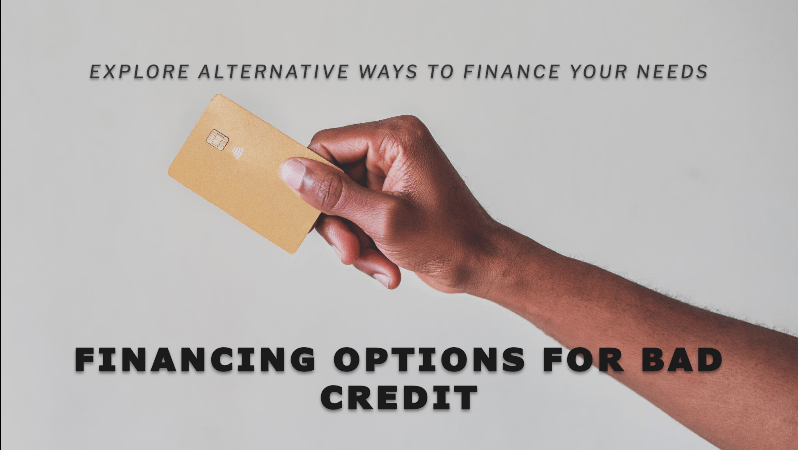When your credit score is in the dumps, it can feel like your financing options are limited. Banks and traditional lenders often give you the side-eye when your credit history is less than stellar. But don’t throw in the towel just yet – there are alternative financing routes you can explore that cater specifically to folks with bad credit.

First up, let’s talk about the types of lenders that are willing to work with bad credit borrowers. Online lenders are often more flexible than brick-and-mortar banks. They may have less stringent credit requirements and can sometimes offer more competitive rates. Peer-to-peer lending platforms, where individuals invest in loans, can also be a good option. And don’t forget about credit unions – these member-owned institutions often have a more personalised approach to lending.
Another avenue to consider is a secured loan, where you put up collateral (like a car or savings account) to minimise the lender’s risk. This can make it easier to get approved, even with a less-than-perfect credit history. Just be aware that if you default on the loan, you could lose your collateral.
If you’re in a bind and need cash fast, a payday loan or cash advance might seem tempting. But proceed with caution – these short-term loans often come with sky-high interest rates and fees that can trap you in a cycle of debt. They should only be used as an absolute last resort.
So, what are the pros and cons of these alternative financing options? On the plus side, they can provide access to credit when traditional banks say no. They may also have more flexible terms, like longer repayment periods or the ability to use alternative data (like utility bills) to evaluate your creditworthiness.
But there are also some potential drawbacks to keep in mind. Alternative lenders may charge higher interest rates and fees to compensate for the increased risk of lending to bad credit borrowers. And some options, like payday loans, can be downright predatory if you’re not careful.
To find the best financing fit for your unique situation, it’s important to do your homework. Shop around and compare offers from multiple lenders – don’t just go with the first one that says yes. Read the fine print and make sure you understand all the terms and conditions, including the interest rate, fees, and repayment schedule.
It’s also a good idea to take a hard look at your budget and make sure you can realistically afford the monthly payments. Don’t bite off more than you can chew just because a lender is willing to give you the money.
If you’re feeling overwhelmed by your options, consider reaching out to a non-profit credit counseling agency. They can help you evaluate your financial situation and provide guidance on the best course of action.
At the end of the day, having bad credit doesn’t mean you’re out of financing options. There are alternative lenders and loan types that cater to folks in your shoes. The key is to do your research, read the fine print, and choose the option that best fits your needs and budget. With a little persistence and know-how, you can find a financing solution that works for you – even with a less-than-perfect credit history.
Bad credit can feel like a financial prison, locking you out of traditional financing options and leaving you scrambling for alternatives. But don’t despair – there are ways to break free and get the funds you need, even if your credit score is in the gutter.
First things first, let’s talk about who’s willing to lend to folks with a checkered credit history. Online lenders are often a good bet – they tend to have more relaxed credit requirements and can sometimes offer better rates than traditional banks. Peer-to-peer lending platforms, where regular people invest in loans, can also be worth checking out. And don’t sleep on credit unions – these member-owned institutions often have a more personal touch when it comes to lending.
Another option to consider is a secured loan, where you put up something of value (like your car or a chunk of change in your savings account) as collateral. This can grease the wheels and make it easier to get approved, even with a less-than-stellar credit score. Just remember, if you can’t make your payments, you could lose your collateral – so make sure you can afford the loan before signing on the dotted line.
If you’re in a pinch and need cash yesterday, you might be tempted by a payday loan or cash advance. But be careful – these short-term fixes often come with astronomical interest rates and fees that can keep you trapped in a cycle of debt. They should be an absolute last resort, and even then, proceed with extreme caution.
So, what are the pros and cons of these alternative financing routes? On the bright side, they can provide a lifeline when traditional banks slam the door in your face. They may also offer more flexible terms, like longer repayment periods or the ability to use things like utility bills to prove your creditworthiness.
But there are also some potential pitfalls to watch out for. Alternative lenders may jack up their interest rates and fees to offset the risk of lending to folks with bad credit. And some options, like payday loans, can be downright predatory if you’re not careful.
To find the best financing fit for your unique situation, you’ll need to put in some legwork. Don’t just jump at the first lender that says yes – shop around and compare offers from multiple sources. Read the fine print with a magnifying glass and make sure you understand every last detail, from the interest rate to the fees to the repayment schedule.
It’s also crucial to take a long, hard look at your budget and make sure you can realistically swing the monthly payments. Don’t let desperation drive you to take on more than you can handle.
If you’re feeling lost in the financing wilderness, don’t be afraid to seek out a guide. Non-profit credit counseling agencies can help you make sense of your options and chart a path forward.
When it comes down to it, bad credit doesn’t have to be a life sentence. There are alternative financing options out there that cater to folks in your situation. The key is to arm yourself with knowledge, read the fine print like a hawk, and choose the option that best fits your needs and budget. With a little grit and savvy, you can find a financing solution that works for you – even if your credit score is more “meh” than “yay.”



